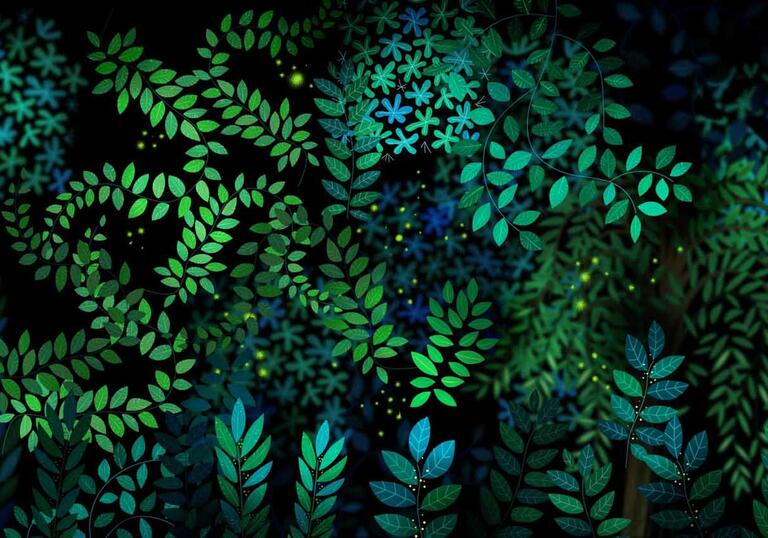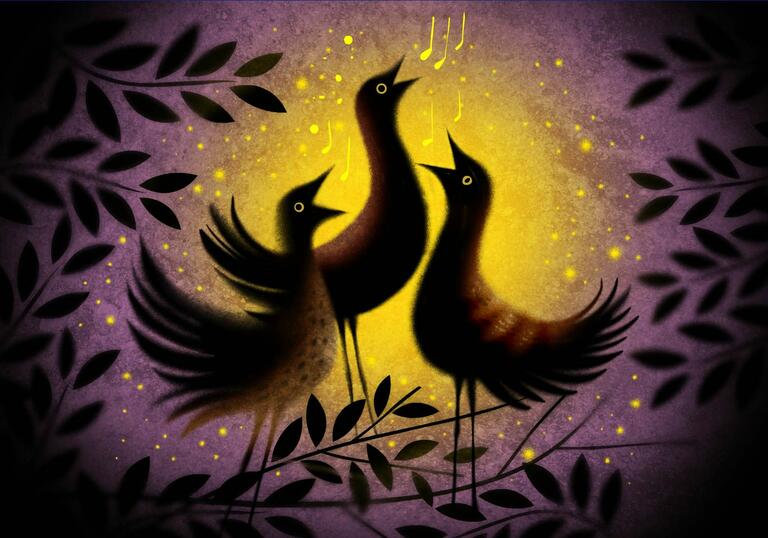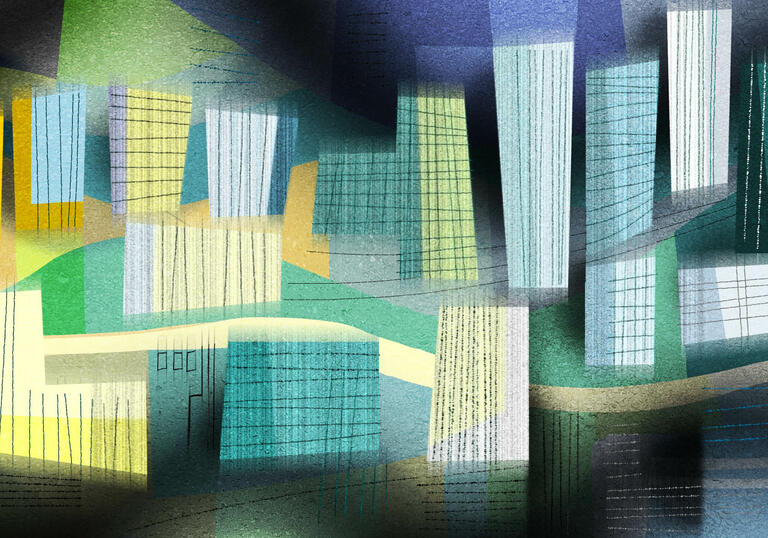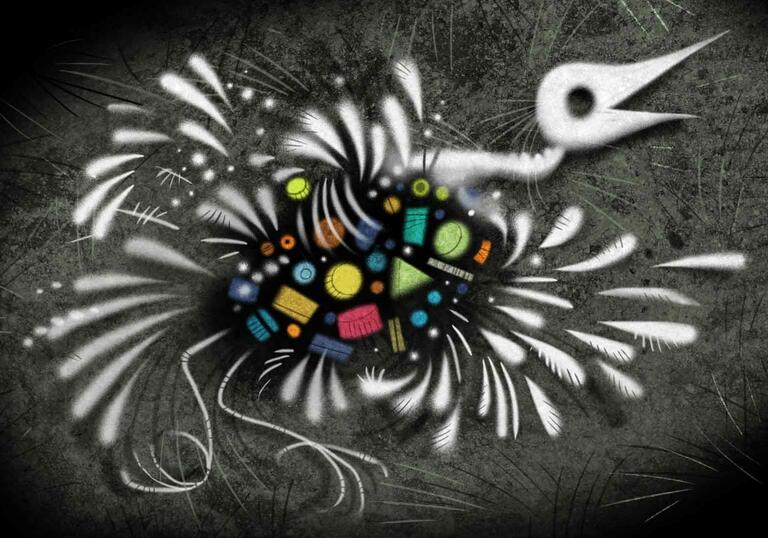

Grégoire Pont is above all faithful to the music. As he works, he follows each piece very closely, bar by bar. When he draws, his movements are in time with the music. The result is not the same as watching a film in a cinema. Grégoire’s animation allows us the space to enjoy seeing and hearing the musicians of the orchestra as they play. His animation does not distract us from the music, but shows it off and adds something new.
So, what can we expect to hear during this concert? Our Precious Planet features music from the 20th century – Grégoire’s favourite period of classical music – as well as more recent music. Grégoire has even chosen a couple of pieces himself: Ginastera’s ‘Danza del trigo’ (‘Dance of the Wheat’) from Estancia, and La baigneuse de Trouville (‘The bather of Trouville’) by Poulenc.
Argentine composer Ginastera wrote his ballet Estancia about a ‘gaucho’ – a heroic, skilled South American horseman – but it is also about the composer’s love of nature. Ginastera said that whenever he crossed the Pampa (South American grassland), ‘my spirit felt itself inundated by changing impressions, now joyful, now melancholy … produced by its limitless immensity and by the transformation that the countryside undergoes in the course of a day.’ Poulenc’s ballet was inspired by the fishing village of Trouville in northwest France, but also takes us to the Eiffel Tower, where a wedding party is in full swing.
The rest of the music we will hear today was chosen by the conductor Dalia Stasevska, and takes us on a journey around Our Precious Planet. There is music by two young British composers, Dani Howard and Anna Meredith – whose piece Nautilus is being performed in a new version for orchestra for the very first time. Benjamin Britten lived by the sea in Suffolk and used thundering percussion, sneering brass and shrill woodwind in his ‘Storm’, which he said is meant to sound like ‘one of those treacherous howling gales so prevalent on the East Coast, which eat away whole stretches of the neighbouring cliffs’. And there is another fierce lightning storm in ‘Panic’ from American composer John Adams’s opera Doctor Atomic.
Like Messiaen – and Grégoire Pont – the Finnish composer Rautavaara loved birds. His Cantus Arcticus (Concerto for Birds and Orchestra) includes recordings of birdsong made near the Arctic Circle and in Finland. Kaaija Saariaho is also Finnish, and birds soar and flutter through her piece L’Aile du songe (‘The Dream Wing’).
For Grégoire Pont, this concert ‘is a poem about the Earth – starting with chaos and becoming our beautiful planet. For me, the Earth is like a magical flower that grows and blossoms, but it is also very delicate and fragile. We have to take care of it.’
© Joanna Wyld

This performance is being recorded by BBC Radio 3 and music from the concert can be heard in Radio 3’s Afternoon Concert in the week commencing 17 Apr.
Co-produced by the Barbican and the BBC Symphony Orchestra.
Programme and performers
Olivier Messiaen Extract from Les offrandes oubliées
Einojuhani Rautavaara 'Swans migrating' from Cantus Arcticus: Concerto For Birds and Orchestra
Kaija Saariaho 'Terrestre l’oiseau dansant' from L'Aile du songe
Dani Howard Argentum
Anna Meredith Nautilus (arr for orchestra, UK premiere)
John Adams 'Panic' from Doctor Atomic Symphony
Benjamin Britten 'Storm' from Four Sea Interludes
Alberto Ginastera 'Danza del trigo' from Estancia
Francis Poulenc La baigneuse de Trouville
BBC Symphony Orchestra
Dalia Stasevska conductor
Grégoire Pont illustrator & animator
Richie Driss presenter
Artist biographies
The BBC Symphony Orchestra has been at the heart of British musical life since it was founded in 1930. It plays a central role in the BBC Proms at the Royal Albert Hall, performing at the First and Last Night each year in addition to regular appearances throughout the Proms season with the world’s leading conductors and soloists.
The BBC SO performs an annual season of concerts at the Barbican in London, where it is Associate Orchestra. Its commitment to contemporary music is demonstrated by a range of premieres each season, as well as Total Immersion days devoted to specific composers or themes, and its richly varied programming includes well-loved works at the heart of classical music, newly commissioned music, collaborations with highly regarded musicians from the world of pop and, in recent years, evenings of words and music featuring readings by well-known authors.
The BBC SO has close relationships with its world-class roster of conductors and guest artists: Chief Conductor Sakari Oramo, Principal Guest Conductor Dalia Stasevksa, holder of the Günter Wand Conducting Chair Semyon Bychkov, Conductor Laureate Sir Andrew Davis and Creative Artist in Association Jules Buckley. It also makes regular appearances with the BBC Symphony Chorus.
The vast majority of performances are broadcast on BBC Radio 3 and a number of studio recordings each season are free to attend. These often feature up-and-coming new talent, including members of BBC Radio 3’s New Generation Artists scheme. All broadcasts are available for 30 days on BBC Sounds and the BBC SO can also be seen on BBC TV and BBC iPlayer and heard on the BBC’s online archive, Experience Classical.
The BBC Symphony Orchestra and Chorus – alongside the BBC Concert Orchestra, BBC Singers and BBC Proms – also offer enjoyable and innovative education and community activities and take a leading role in the BBC Ten Pieces and BBC Young Composer programmes.

